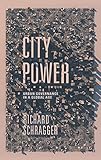City power : Urban governance in a global age / Richard Schragger.
Publisher: New York, NY : Oxford University Press, 2016Description: xi, 322 pages ; 25 cmContent type:- text
- unmediated
- volume
- 9780190246662 (hardback)
- Municipal government -- Economic aspects
- Municipal government -- Social aspects
- Urban policy
- Income distribution -- Government policy
- Living wage movement
- POLITICAL SCIENCE / Public Policy / City Planning & Urban Development
- POLITICAL SCIENCE / Economic Conditions
- POLITICAL SCIENCE / Government / Local
- 307.76 SCH 23
- HT321 .S36 2016
- POL002000 | POL023000 | POL040040
| Item type | Current library | Shelving location | Call number | Status | Date due | Barcode |
|---|---|---|---|---|---|---|
 BOOKs
BOOKs
|
National Law School | MPP Section | 307.76 SCH (Browse shelf(Opens below)) | Available | 36452 |
Includes index.
Table of contents
Introduction: Cities, Capital, and Constitutions
1. What is the City?
Building Blocks of Economic Life
Byproducts and Products
The City as a Process
Conclusion: Mystery and Modesty
2. Decentralization and Development
Competition and Growth
The Historic Vulnerability of City Status
What Does Decentralization Do?
Conclusion: Freeing Cities from a False Constraint
3. Vertical Federalism: Making Weak Cities
Legal Autonomy and Political Influence
Federalism and City Power
Technocracy versus Democracy
Conclusion: "Things Could be Worse. I Could be a Mayor."
4. Horizontal Federalism: Encouraging Footloose Capital
Inter-Municipal Border Controls
Subsidizing Mobile Capital
Conclusion: Economic [Dis]Integration
5. The City Redistributes I: Policy
The Limits of City Limits
Mandating a Living Wage
Land-Use Unionism
Regulating Through Contract
Conclusion: Exercising Urban Power
6. The City Redistributes II: Politics
Municipal Politics Matters
Immobile Capital
Translocal Networks
Economic Localism
Conclusion: The Re-emergence of the Regulatory City
7. Urban Resurgence
Urban Policy and Urban Resurgence
Assessing Economic Development Strategies
Uncertainty and Economic Development
Conclusion: Back to Basics
8. Urban Crisis
Debt and Discipline
Of Bailouts and Bankruptcy
The Politics of Municipal Failure
Conclusion: Marginal Cities
Conclusion: Can Cities Govern?
Notes
Acknowledgements
Index
"Reigning theories of urban power suggest that in a world dominated by footloose transnational capital, cities have little capacity to effect social change. In City Power, Schragger challenges this conventional wisdom, arguing that cities can and should pursue aims other than making themselves attractive to global capital. Using the municipal living wage movement as an example, Schragger explains why cities are well-positioned to address issues like income equality and how our institutions can be designed to allow them to do so"-- Provided by publisher.

There are no comments on this title.